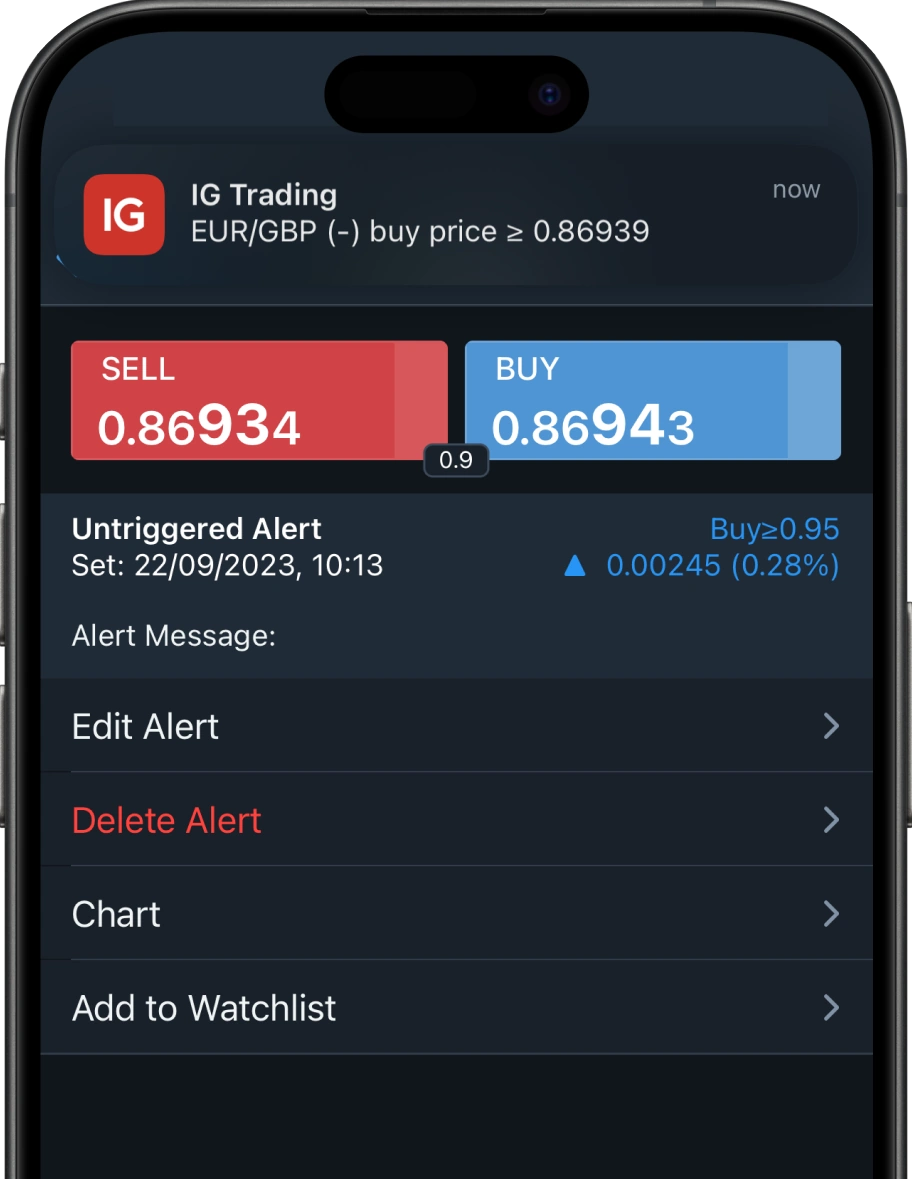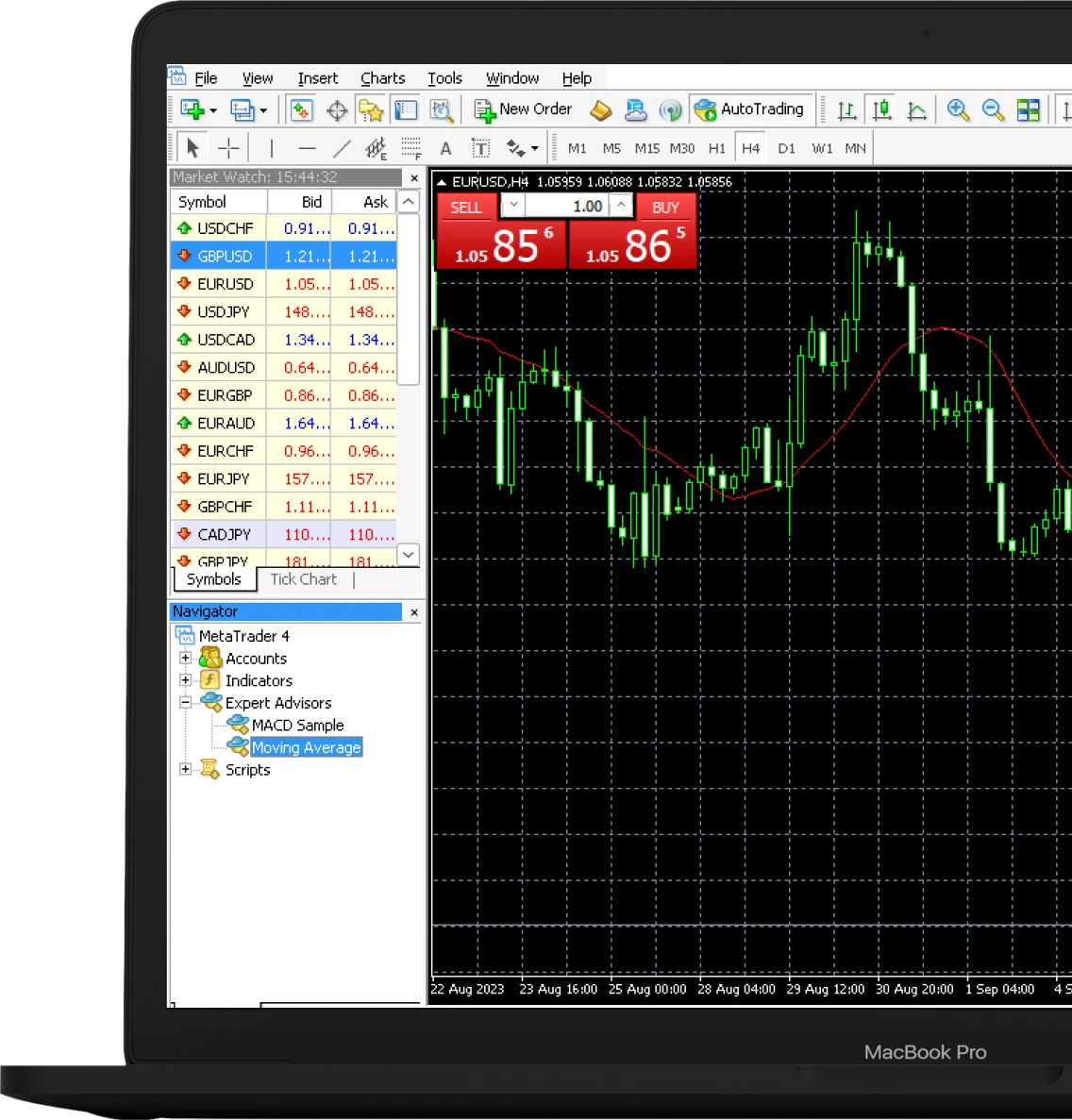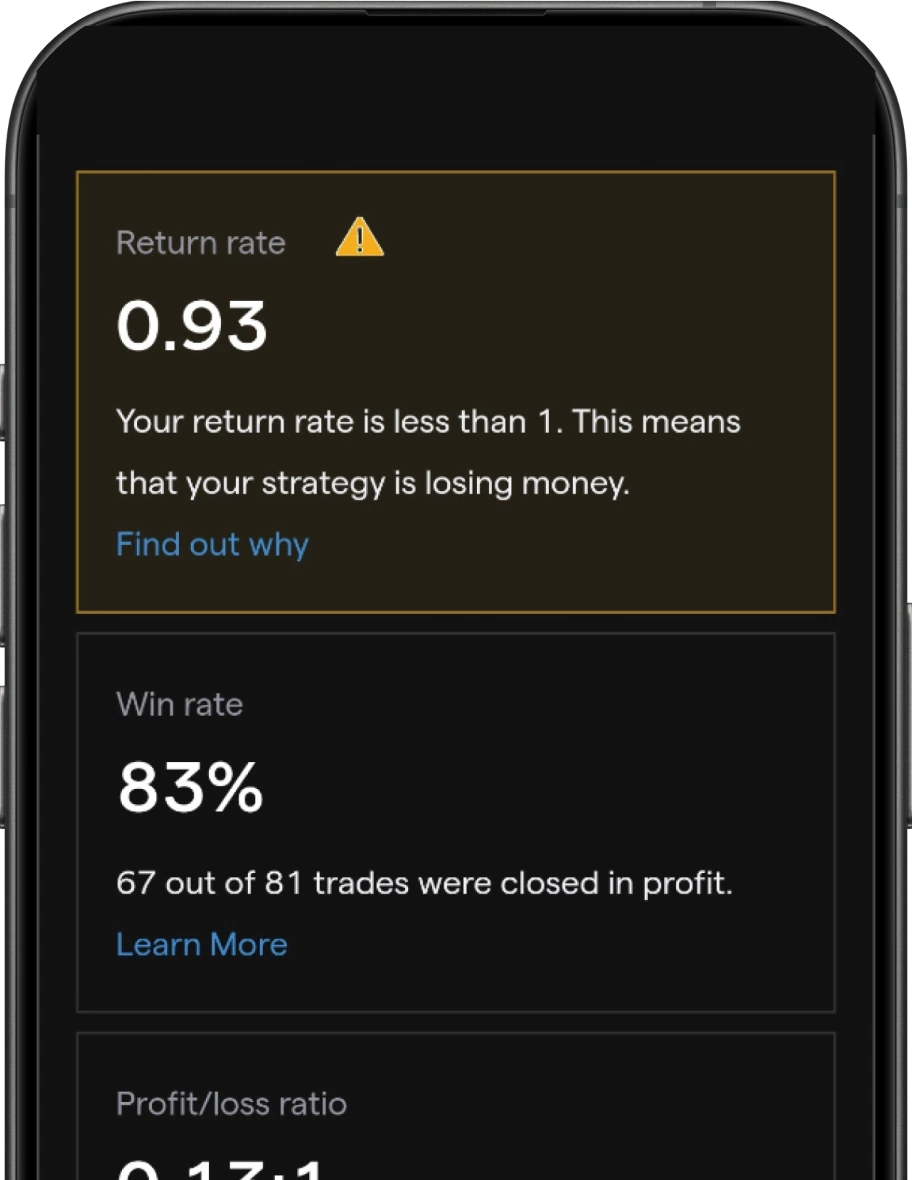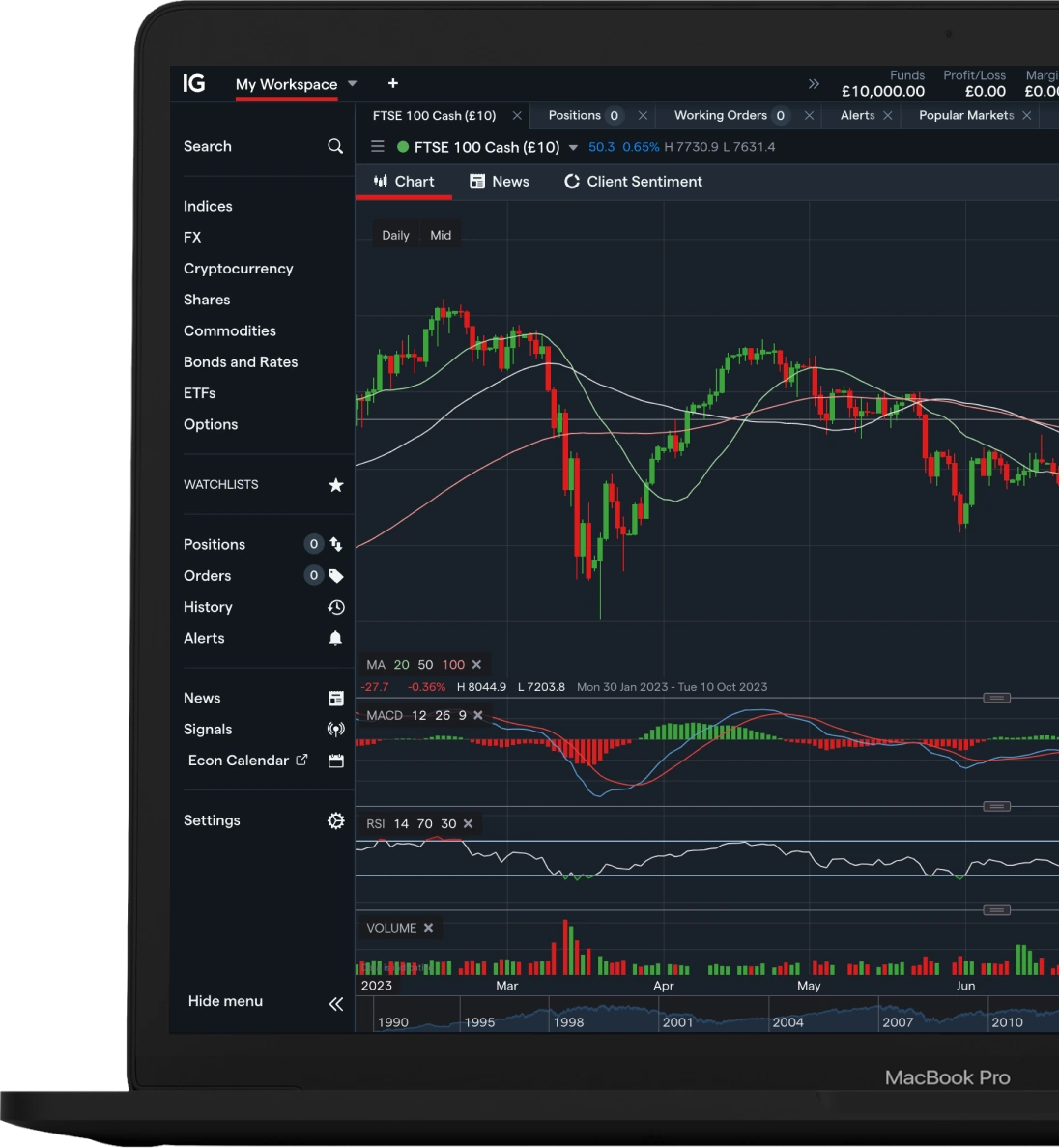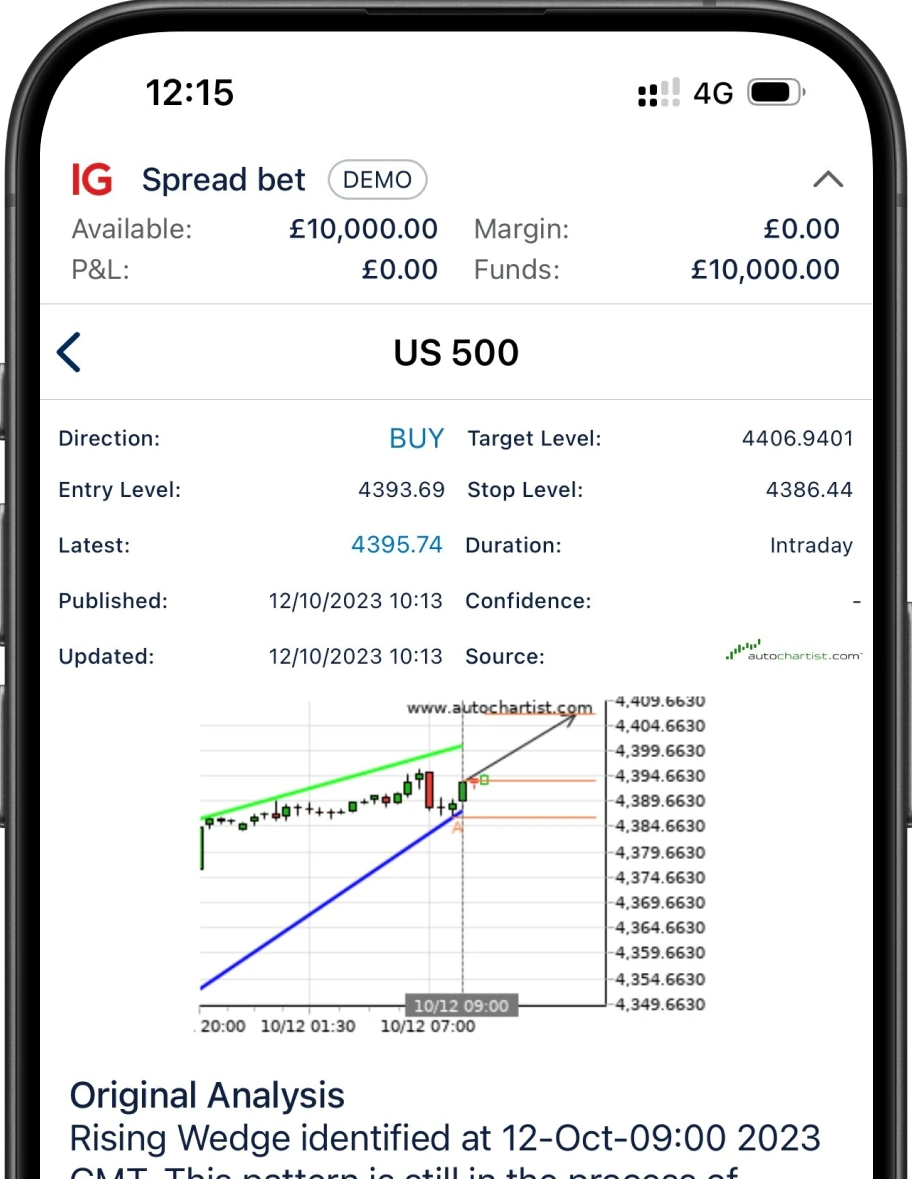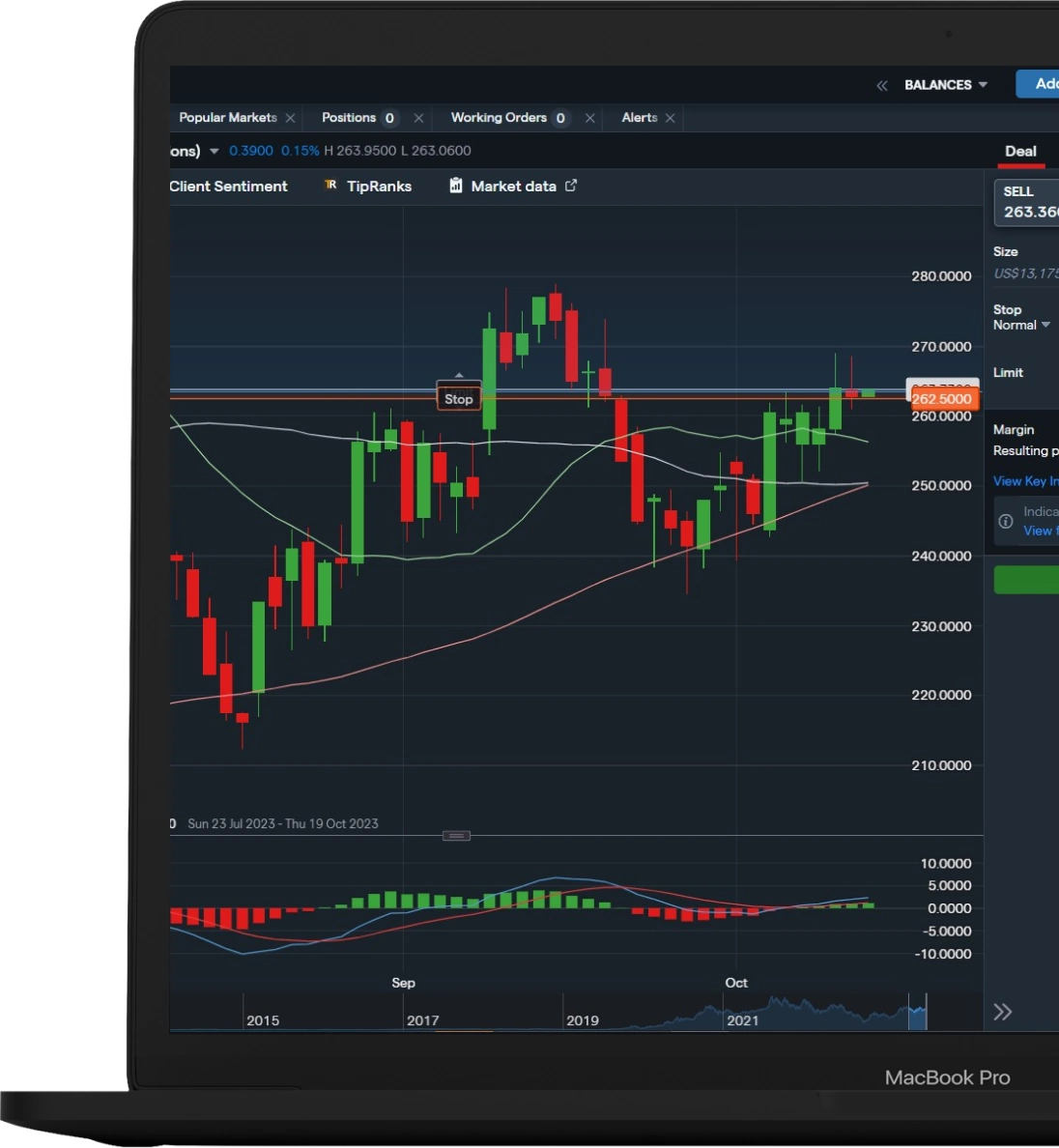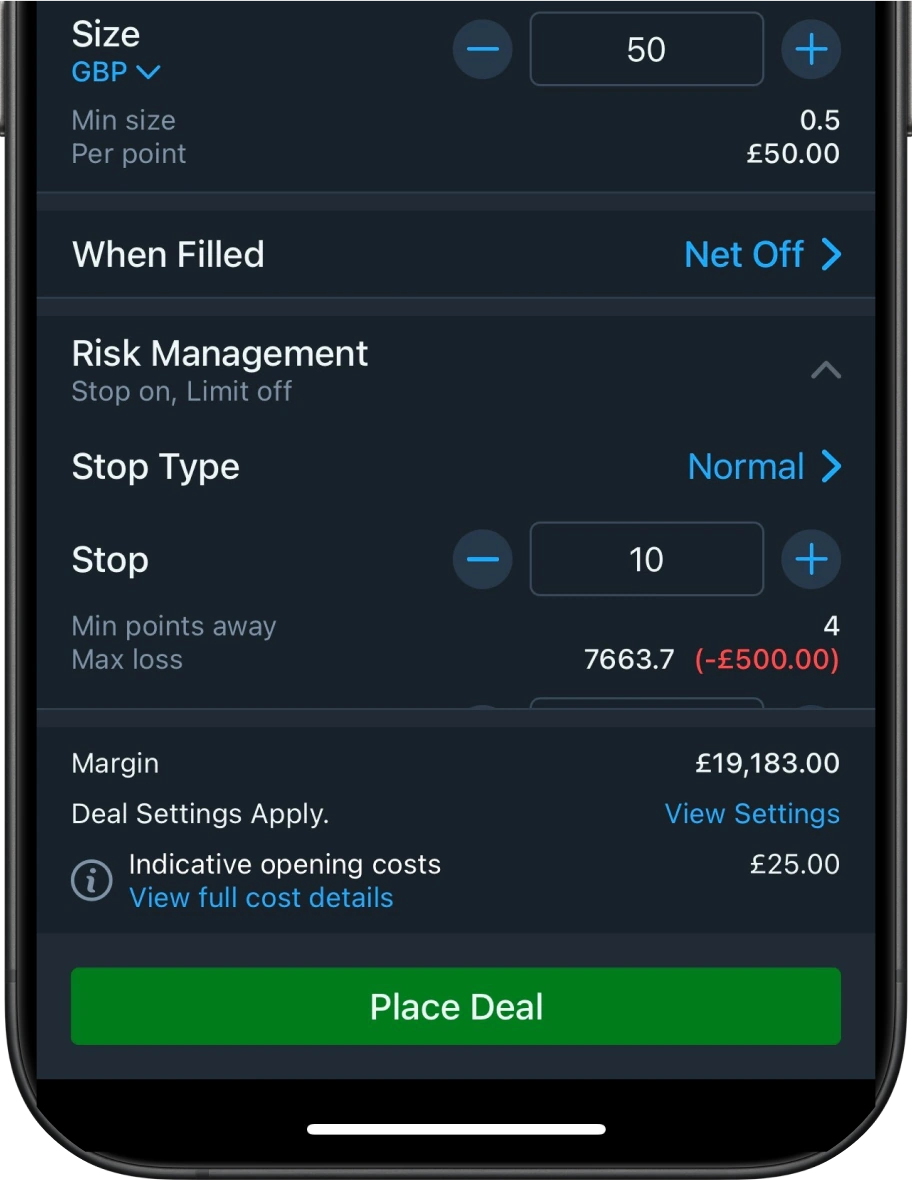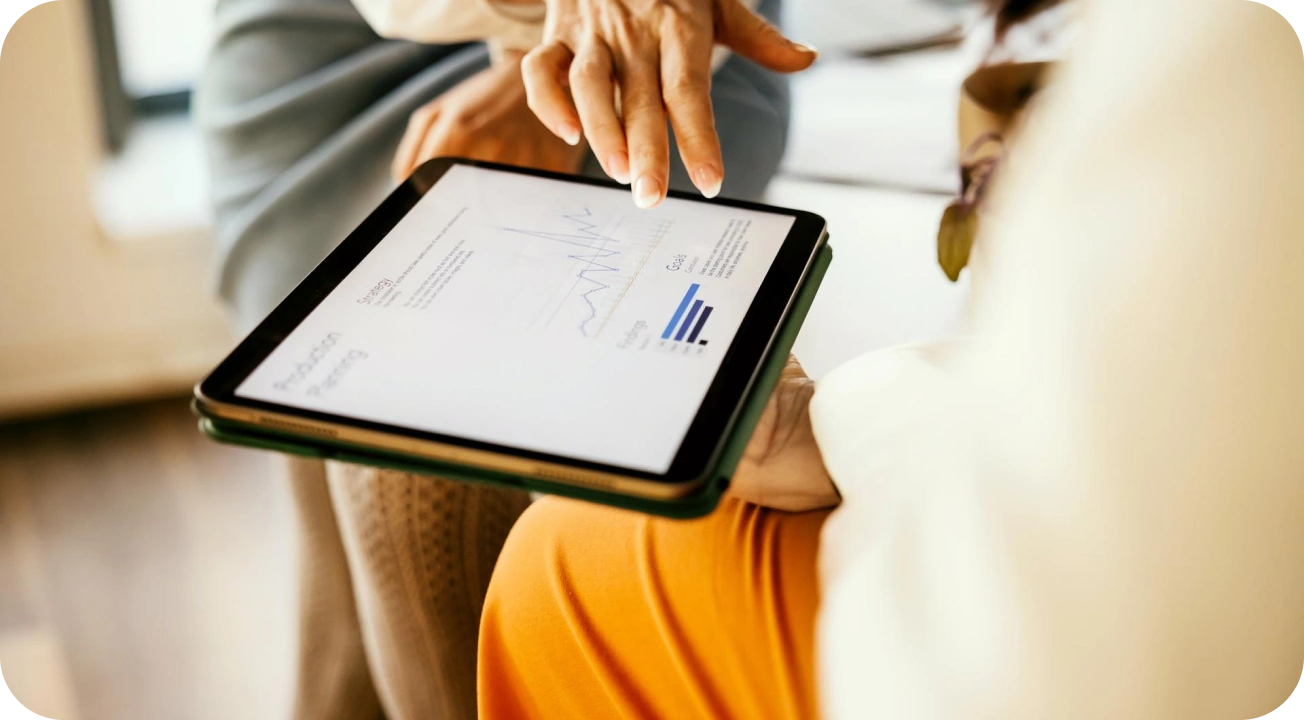Trade forex majors with IG
Turn ambition into reality with the UK’s #1 retail forex provider 1
- Weekend trading and more extended hours than anywhere else
- 80+ pairs including GBP/USD, EUR/USD & USD/JPY
- Zero commission 2; spreads as low as 0.6
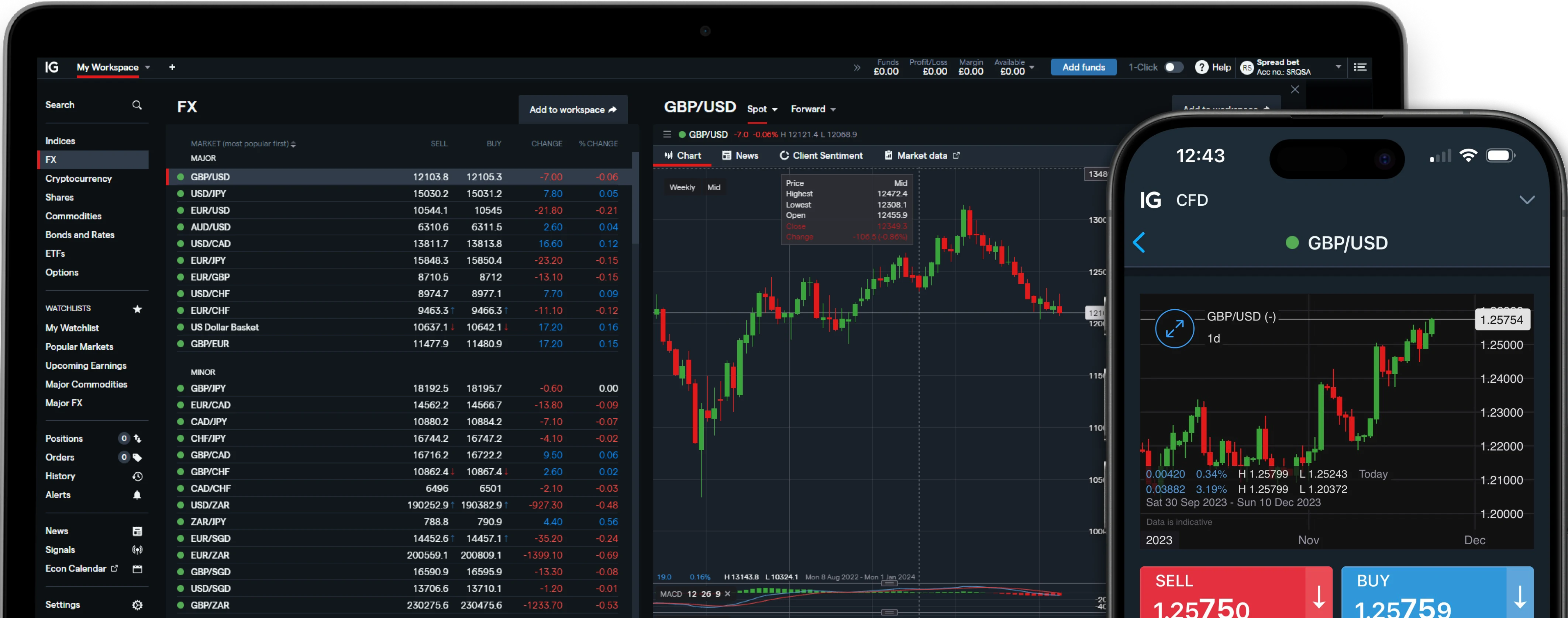
More than a trading platform
We support you at every stage of your journey
IG Academy
Access education for any and all experience levels. Free online courses, webinars, seminars, and video tutorials.
Round-the-clock support
Available every hour from 8am Saturday to 10pm Friday. Access live chat and designated support team members for 1-2-1 calls.
Easy-to-use app
Our trading platforms and mobile app are designed to be user-friendly and straightforward.
Exclusive trading hours and pricing
Exclusive 24/7 pricing on GBP/USD through weekend trading. 3 Extended hours on more than 80 key US stocks. 4
Access 80+ forex pairs
Gain the ability to trade on over 80 FX pairs; under most conditions, we can offer our minimum spread.
Zero commission
Take advantage of spreads form 0.8 pips, with zero commission.
Trade your way
Find the right account for you. Trade and invest forex, shares, indices, commodities and more.
Speculate on price changes, without having to own the underlying asset. Use up to 30x leverage i Leverage is available on several financial products, including spread bets, CFDs and forex trades. When trading using leverage, the provider will only ask for a fraction of the total value of your position: the rest is effectively lent to you by the provider. to start trading with minimal upfront capital.
Using leverage can magnify profits but also amplify losses.
Learn moreZero tax 5 and tight spreads. i A spread in trading is the difference between the buy (offer) and sell (bid) prices quoted for an asset. This is also our charge for executing your trade. Reach thousands of markets and asset classes with IG, the inventors of financial spread betting.
Tax laws are subject to change and depend on individual circumstances. Tax law may differ in a jurisdiction other than the UK.
Learn moreHere’s what our clients say
Proudly award-winning
2023
#1 Overall Broker ForexBrokers.com
2023
#1 Trust Score ForexBrokers.com
2023
Best Platform for the Active Trader ADVFN International Financial Awards
2023
Best Multi Platform Provider ADVFN International Financial Awards
Join IG
It takes just 3 simple steps
A few questions
Let us know a bit more about you
Get verified, instantly
We can usually verify your identity immediately
Fund and start trading
We accept all major credit cards, Apple Pay and bank transfers.
Trade seamlessly
On our user-friendly and award-winning platforms
All the features you need, whenever and wherever you need them.
Learn moreOur comprehensive online platform keeps you in control with alerts, signals, and trading analytics supplementing your strategy.
Learn moreUsing ProRealTime, MetaTrader 4 (MT4) or L2 Dealer? Looking for advanced charting or automated trading i Automated trading is the use of algorithms for making trade orders. ? Trade with IG and enjoy exclusive add-ons.
Learn more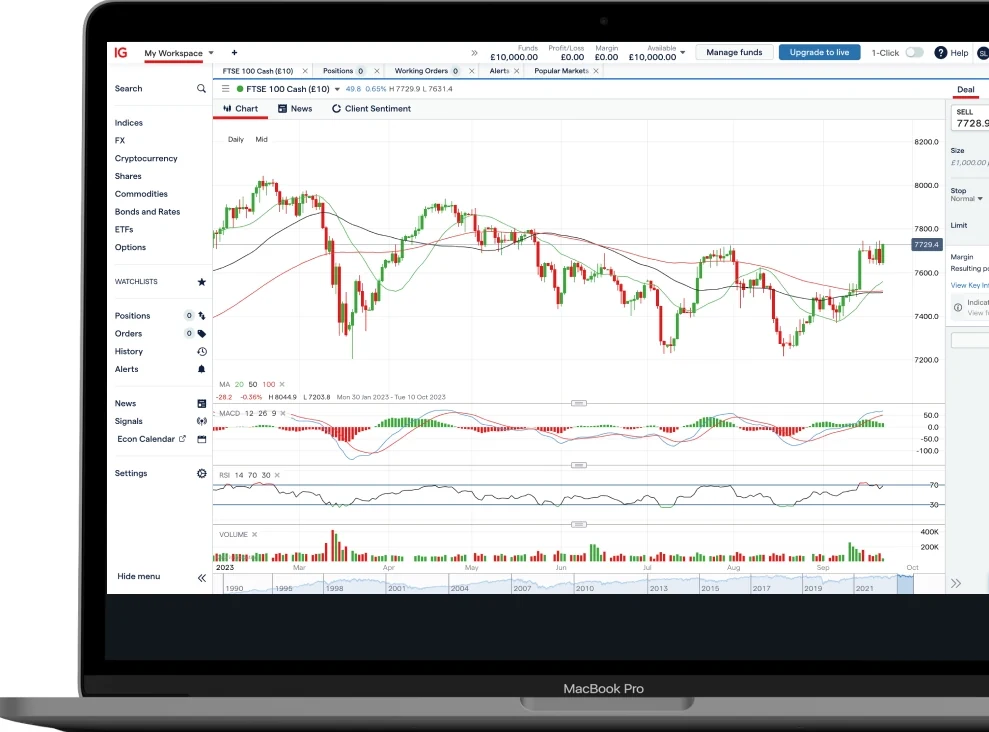
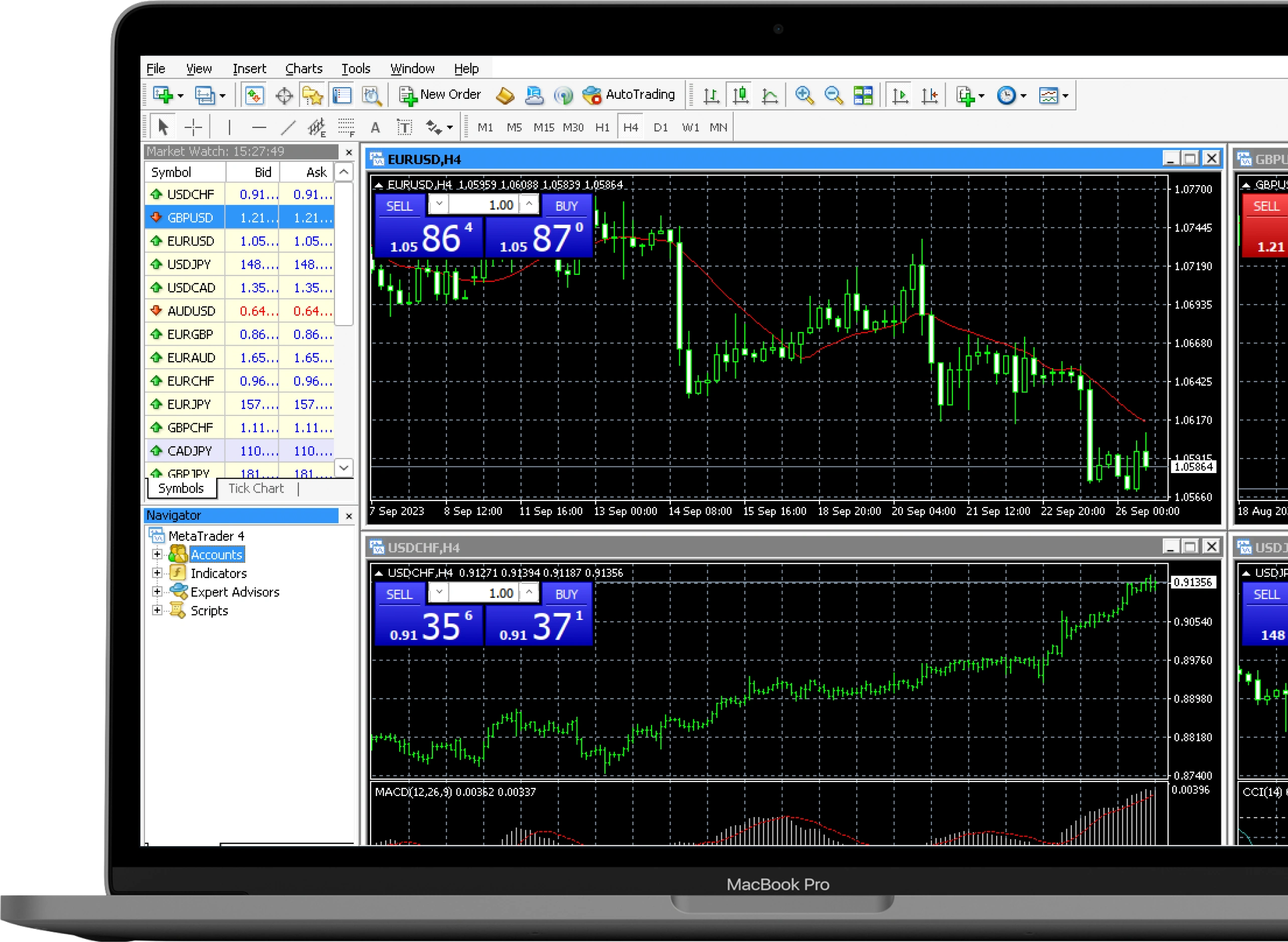
Equip yourself for success
With powerful trading tools
The numbers speak for themselves
0
years’ expertise
0
Countries
0
global clients
0
+worldwide markets
Everything you need, in one place
On our user-friendly and award-winning platforms
An award-winning platform is just the start

Try our free demo account
Test your trading skills and backtest your strategy, without pressure
- £10,000 virtual funds
- Simulates a live trading environment
- Access exclusive education content
Always transparent
- Open a free account, with no hidden costs
- No management fees, ever, for CFDs or spread betting
| Spot FX | Retail margin i CFDs are leveraged, meaning you can win, or lose, a significant amount more than you deposit initially. The initial deposit is called margin. | Leverage i Leverage is available on several financial products, including spread bets, CFDs and forex trades. When trading using leverage, the provider will only ask for a fraction of the total value of your position: the rest is effectively lent to you by the provider. Using leverage can magnify profits but also amplify losses. equivalent | Professional margin 6 | Leverage equivalent |
|---|---|---|---|---|
| EUR/USD | 3.33% | 1:30 | 0.45% | 1:222 |
| AUD/USD | 3.33% | 1:30 | 0.45% | 1:222 |
| USD/JPY | 3.33% | 1:30 | 0.45% | 1:222 |
| EUR/GBP | 3.33% | 1:30 | 0.45% | 1:111 |
| GBP/USD | 3.33% | 1:30 | 0.45% | 1:111 |
| EUR/JPY | 3.33% | 1:30 | 0.45% | 1:222 |
| USD/CHF | 3.33% | 1:30 | 1.35% | 1:74 |
| Spot FX | IG min. spread | IG av. spread 6 |
IG av. spread (00:00-21:00) 7 |
DMA av. spread 8 |
|---|---|---|---|---|
| EUR/USD | 0.6 | 1.13 | 0.86 | 0.165 |
| AUD/USD | 0.6 | 1.33 | 1.07 | 0.295 |
| USD/JPY | 0.7 | 1.26 | 0.96 | 0.242 |
| EUR/GBP | 0.9 | 2.51 | 1.83 | 0.540 |
| GBP/USD | 0.9 | 2.38 | 1.84 | 0.589 |
| EUR/JPY | 1.5 | 2.57 | 1.96 | 0.678 |
| USD/CHF | 1.5 | 2.29 | 1.95 | 0.399 |
Our foundations
- Established and trusted: FTSE 250 listed
- Join the market leaders: 1 over 49 years’ trusted experience
- Always be informed: direct access to expert analysis and IG’s latest news
- IG Academy: acquire vital knowledge and crucial skills
- Peer support: join and interact with a community of expert traders
Search our markets then start your journey.
FAQs
Forex trading means exchanging one currency for another. Forex is always traded in pairs which means that you’re selling one to buy another.
Forex trading works by simultaneously buying one currency while selling another. If the currency you have bought increases in value against the currency you have sold, you can close your position for a profit. If not, you make a loss.
Forex markets are always quoted in pairs – EUR/USD, for example – because you’ll always be trading one currency for another. The exchange rate is how much one unit of the first (‘base’) currency costs in the second (‘quote’) currency Say the EUR/USD exchange rate is quoted as 1.1700. This means that it would cost 1.17 dollars to buy a single euro.
Pips are a forex-specific synonym for basis points or ‘points’ - the smallest amounts by which a market price can change. For major currencies a pip is a standardized unit of 1/100th of 1%, or 0.0001, except for pairs including the Japanese yen. For these pairs, a pip is equal to 0.01. At IG, we tend to use the term ‘pips’, but you may see ‘points’ used interchangeably by other brokers.
There is no difference between forex trading and currency trading, as both mean that you’re exchanging one currency for another. When forex trading or currency trading, you’re attempting to earn a profit by speculating on whether the price of a currency pair will rise or fall.
You can make money from forex trading by correctly predicting a currency pair’s price movements and opening a position that stands to profit. For example, if you think that a pair will decline in value, you could go short and profit from a market falling.
Alternatively, if you think a pair will increase in value, you can go long and profit from an increasing market.
You can get started trading FX with a forex trading account. Plus, you’ll also need to be familiar with what moves the forex market – like central bank announcements, news reports and market sentiment – and take steps to manage your risk accordingly.
The costs and fees you pay when trading currency will vary from broker to broker. But, you should bear in mind that you’ll often be trading currency with leverage, which will reduce the initial amount of money that you’ll need to open a position. Be aware though that leverage can increase both your profits and your losses.
Approximately $6.6 trillion worth of forex transactions take place daily, which is an average of $250 billion per hour. The market is largely made up of institutions, corporations, governments and currency speculators – speculation makes up roughly 90% of trading volume and a large majority of this is concentrated on the US dollar, euro and yen.
Yes, forex trading is risky because it’s a highly traded market, which means it has equally high liquidity and volatility. You should always take steps to manage your risk , especially when trading on leverage, as your losses can exceed your initial outlay.
There are a variety of ways that you can manage your currency risk. This includes attaching stops and limits to your position, setting price alerts and using a trading style that matches your attitude to risk.
Anyone can trade forex if they develop their trading knowledge, build a forex trading strategy and gain experience trading the market. But, the volatility of the forex market is a unique environment that takes time to understand.
Forex trading requires an intermediate to advanced understanding of how the market works, which tends to put beginners at a disadvantage. That’s why beginners should brush up on their knowledge on the forex market by using our educational resource hub and our demo account. Once they’re confident in their skill, they can advance to the live account.
Major currency pairs are those that trade in the highest volume on a daily basis. These pairs tend to be incredibly liquid and trade 24 hours a day, usually with very narrow spreads. Some examples include EUR/USD, USD/JPY, GBP/USD and USD/CHF.
What constitutes a minor currency pair can vary depending on where you look. Some brokers stipulate that a minor pair can’t include the US dollar, for example, and as such refer to them as ‘crosses’.
More generally, a minor pair is any currency pair that’s traded less frequently than the majors, even if one or both constituent pairs also appear in a major currency pair. Some of the more popular include CHF/JPY, GBP/CAD and EUR/SGD.
The easiest forex pair to trade will vary from trader to trader, depending on their interests and attitude to risk. A good place for beginners to start would be the major forex pairs, which have a larger trading volume – because this will result in higher liquidity and tighter spreads.
Once you have established how much capital you have available, you will then need to start preparing the rest of your forex trading plan – this should include what you want to get out of trading forex, the time you are willing to commit to trading, researching which markets you want to trade, your risk management strategy and your trading strategy.
You only need to put down a small deposit (usually 3.33% of the total position size) when you trade forex with derivatives, because you’ll be trading with leverage. But, while that’s all you need to start trading, remember that profits and losses will be calculated using the full size of the position – so you should ensure that you can cover the downside if the market moves against you.
The most traded currency pairs are the major crosses like EUR/USD, USD/JPY, GBP/USD and USD/CHF. For those just starting to trade the forex market, it’s important to understand that the majority of forex trading is concentrated across these combinations, which can make them easier to trade as they have higher liquidity.
The two main ways to trade forex are with a forex spread bet or a forex CFD trade. Both of these enable you to trade on the future direction of a forex pair’s price without having to take ownership of physical currencies.
- Trading forex CFDs means you’re agreeing to exchange the difference in price of a forex pair from the point at which the CFD is opened, to the point at which it’s closed
- Forex spread betting means you’re betting an amount of money per point of movement in the underlying currency pair’s price
But, there are other differences between spread bets and CFDs that you should take time to familiarise yourself with.
The tax on forex positions does depend on which financial product you are using to trade the markets.
When you trade via a forex broker or through CFDs, any gains to your forex positions are taxable. However, your losses are tax-deductible, and depending on your circumstances can also be used to offset gains made elsewhere. Alternatively, spread bets are a tax-free way to speculate on the forex market.
Despite the enormous size of the forex market, there is very little regulation because there is no governing body to police it 24/7. Instead, there are several national trading bodies around the world who supervise domestic forex trading, as well as other markets, to ensure that all forex providers adhere to certain standards. For example, in the UK the regulatory body is the Financial Conduct Authority (FCA).
Gaps are points in a market when there is a sharp movement up or down with little or no trading in between, resulting in a ‘gap’ in the normal price pattern. Gaps do occur in the forex market, but they are significantly less common than in other markets because it is traded 24 hours a day, five days a week.
However, gapping can occur when economic data is released that comes as a surprise to markets, or when trading resumes after the weekend or a holiday. Although the forex market is closed to speculative trading over the weekend, the market is still open to central banks and related organisations. So, it is possible that the opening price on a Sunday evening will be different from the closing price on the previous Friday night – resulting in a gap.
A forex trading strategy should consider the trading style that best suits your goals and time commitments. For example, a day trading strategy involves opening and closing positions within a single trading day, taking advantage of small intraday movements in a currency pair’s price.
The forex market is extremely volatile, so a currency pair that moves up one week might go down the next. But, the majority of forex trading volume is concentrated in a handful of forex pairs like EUR/USD, USD/JPY, GBP/USD, AUD/USD and USD/CHF.
That’s because these pairs represent some of the most widely-circulated currencies and so they attract the most traders. This results in a greater amount of price movement as the balance between buyers and sellers constantly shifts.


